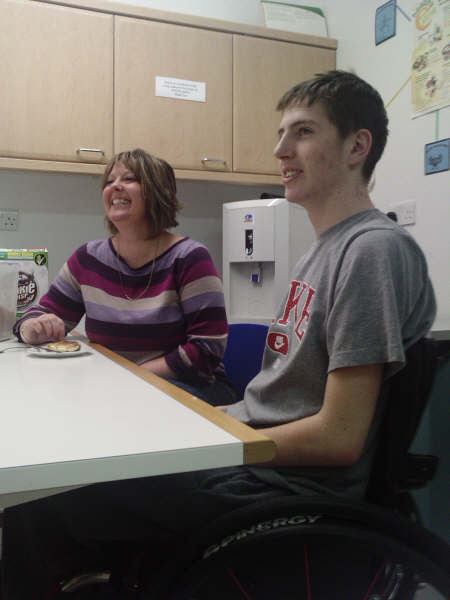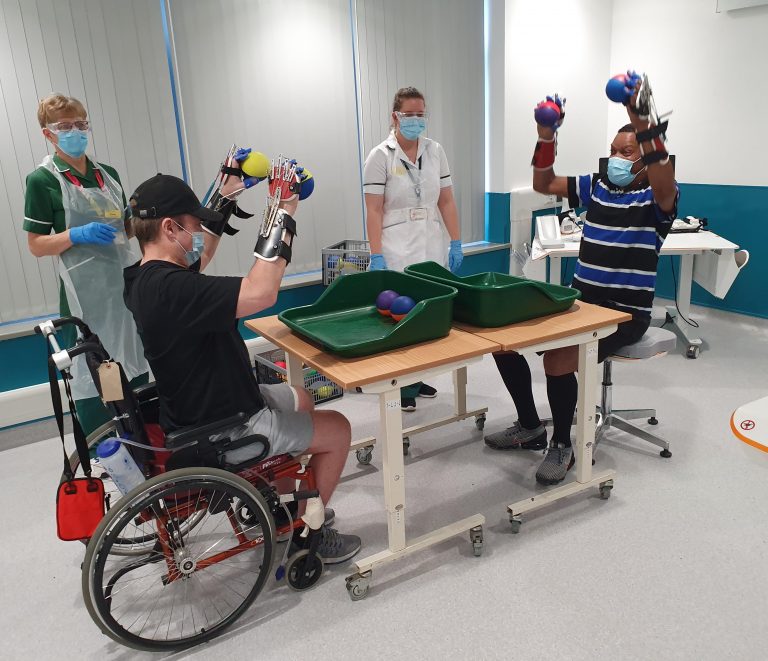Autonomic Dysreflexia
7 Items
Exercise and SCI
3 Items
Bladder and Bowel Management
7 Items
Your skin after SCI
5 Items
Support for Family & Friends
3 Items
Growing up with SCI
3 Items
What to expect
On arrival to St Francis Ward you will be met by the nursing staff,
who will introduce you to the ward and the main areas in the NSIC.
- Individual members of the team will complete initial assessments during the first week of admission.
- There will be the opportunity to discuss the assessments and the programme or timetable intensity with you.
- You and your child / adolescent will be offered appropriate information and the opportunity for feedback at every stage of the rehabilitation process.
- Rehabilitation requires a team approach. Children/adolescents and their families/carers are the most important part of the team and participate in the planning and decision making.
- The Ward liaises with all referring hospitals, medical teams, families, schools and local therapeutic service providers to complement the inpatient service.
- Planning begins for constructive timely discharge from the point of admission.
- Rehabilitation is a process that enables children/adolescents to reach their full potential after their illness or accident.
- You may be asked to take part in treatment sessions with your child
or
it may be suggested that your child/ adolescent will focus more if they are not accompanied by a parent. - Guidance and support is given by therapists and nurses to you at all times if you wish to participate in any of your child/adolescent’s care and treatments.

The staff welcomes any information that a parent can give
with respect to their child/adolescent’s needs, which may improve their care.
Involving the wider family
- There may be occasions when you would like other members of the family to see what goes on in therapy
- However, it is not advised that large groups of relatives and friends attend therapy areas without prior consultation with your treating therapists.
- This will allow your child to concentrate on activities in therapy and also allow space for others to exercise.
- We will do our best to introduce you all to the rehabilitation programme as quickly and effectively as possible.
Leaving Your Child/Adolescent
- As your child becomes more familiar and settled into the ward, (and depending on their age), you may want to arrange to leave your child and tend to other family needs.
- It is natural to feel concerned about leaving your child, especially if you live a long distance away or if you have spent long periods of time with your child in an intensive care unit.
- We do want you to feel confident when you decide to leave, so please talk through any concerns you may have with the staff.
- Feel reassured that it is normal and helpful for your child to receive therapy without the support of a parent, in the same way they would attend school without a parent.
- It’s our experience that, after a period of settling in, children make friends and socialize with others on the ward more easily when their parents are not present.
Behaviour Management
We aim to work in partnership with children/adolescents and their families with regards to behaviour management, and believe that we all have a responsibility for the behaviour.
We have developed a behavioural management strategy for St Francis Ward
- The purpose is to promote positive behaviour and create a safe and secure environment for patients, family and staff.
- A copy of this strategy is available at your request.
The overarching aims of our approach to behaviour management are:
- To promote and reinforce positive behaviour and encourage engagement in rehabilitation.
- To create a safe and secure environment that enables effective rehabilitation.
- To support children/adolescents in a developmentally appropriate way to take responsibility for their care and rehabilitation.
- To foster a mutual relationship of respect.
- To address unacceptable behaviour in non-confrontational way.
- To apply a consistent approach to dealing with unacceptable behaviour
- To encourage the involvement of parents and carers in developing a shared approach to managing unacceptable behaviour.
- To encourage the child/adolescent to accept responsibility for their own behaviour.
If concerns arise, a behaviour contract may be used to help provide structure and consistency.
This helps the child or adolescent to understand what is expected of them during their admission.
Contact details and referral process
Address:
St Francis Ward
National Spinal Injuries Centre
Stoke Mandeville Hospital
Buckinghamshire, HP21 8AL, UK
Ward telephone number: 01296 315805
National online referral portal: http://www.spinalreferrals.nhs.uk




